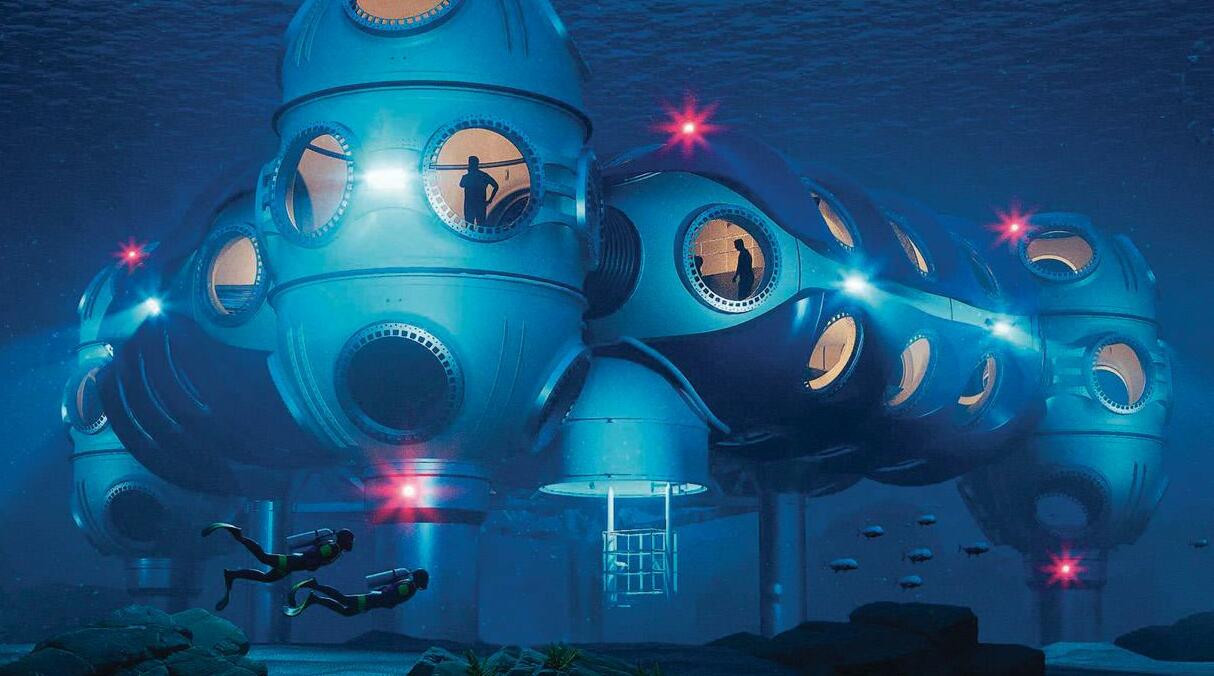कोशिश गोल्ड - मुक्त
GOING DEEP
BBC Science Focus
|March 2025
An advanced new research station is being developed to explore the potential for a human settlement under the ocean
-

Whether it’s to escape environmental collapse or to explore new, unknown territories, the drive to establish human colonies in places other than on Earth has been gaining momentum in recent years. And while proposed bases on the Moon or Mars might get all the headlines, there’s another equally hostile and largely unknown location a lot closer to home that explorers are also looking towards: the bottom of the ocean.
This is by no means a new idea. Starting with French oceanographer Jacques Cousteau in the 1960s, people have been building and spending limited amounts of time in underwater habitats for decades. More recently, NASA has been sending people to the Aquarius Reef Base, a research facility on the ocean floor just off the coast of Florida, since 2001. Located 20m (approx 65ft) below the surface, scientists, engineers and prospective astronauts typically spend 7–14 days in the module.
New technology is making the prospect of longer-duration stays underwater possible, though, and British company, Deep, is employing it to develop habitats specifically for that purpose. The tech may be up to the task, but the real question is, are we?
ABOVE THE ATMOSPHERE, BELOW THE SEA
Humans are relatively weak. We don’t do well without oxygen or sunlight, and we’re not big fans of major changes in pressure. In other words, we’re not necessarily the best candidates for life at the bottom of the sea.
यह कहानी BBC Science Focus के March 2025 संस्करण से ली गई है।
हजारों चुनिंदा प्रीमियम कहानियों और 10,000 से अधिक पत्रिकाओं और समाचार पत्रों तक पहुंचने के लिए मैगज़्टर गोल्ड की सदस्यता लें।
क्या आप पहले से ही ग्राहक हैं? साइन इन करें
BBC Science Focus से और कहानियाँ

BBC Science Focus
World's biggest cobweb is home to 100,000 spiders
Spiders don't normally create such large colonies, so there's no need to worry about finding one in your basement
1 min
February 2026

BBC Science Focus
A dementia vaccine could be gamechanging – and available already
Getting vaccinated against shingles could protect you from getting dementia, or slow the progression of the disease
1 mins
February 2026

BBC Science Focus
DATA IN SPACE
An unusual spacecraft reached orbit in November 2025, one that might herald the dawn of a new era.
7 mins
February 2026

BBC Science Focus
Climate change is already shrinking your salary
No matter where you live, a new study has found warmer temperatures are picking your pocket
4 mins
February 2026

BBC Science Focus
A MENTAL HEALTH GLOW-UP
Forget fine lines. Could Botox give you an unexpected mental health tweakment?
3 mins
February 2026
BBC Science Focus
Most people with high cholesterol gene don't know they have it
Standard testing struggles to detect the condition
1 mins
February 2026

BBC Science Focus
HOW CAN I BOOST MY IQ?
If you're serious about getting smarter, it's time to ditch the brain-training apps
4 mins
February 2026

BBC Science Focus
Humans are absolutely terrible at reading dogs' emotions
Think you can tell how our furry friends are feeling? Think again
1 mins
February 2026

BBC Science Focus
HOW TO TEACH AI RIGHT FROM WRONG
If we want to get good responses from AI, we may need to see what it does when we ask it to be evil
3 mins
February 2026

BBC Science Focus
What Australia's social media ban could really mean for under-16s
Many people think social media is bad for our kids. Australia is trying to prove it
5 mins
February 2026
Listen
Translate
Change font size
